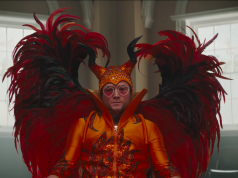The Moulin Rouge was an actual place in Montmartre, just outside Paris, at the end of the 19th century. It was a nightclub of legendary proportions, where the Bohemians bohemed till all hours of the night with the cancan dancers, prostitutes and bartenders.
If Kurt Cobain had been around then, I can imagine his “Smells Like Teen Spirit” being sung as a paean to nihilistic youthful debauchery. Since he wasn’t, we have Baz Luhrmann’s film “Moulin Rouge” to fill in the blanks, re-creating the nightspot with modern music and vivid emotions, juxtaposing images, ideas and icons with recklessly methodical abandon.
“Moulin Rouge” is a love story — a rather simple one, really, dressed up to appear grandly operatic, which it does. At that outset, we meet our narrator and protagonist, Christian (Ewan McGregor), a poet who informs us that what we’re about to see happened one year earlier, and that the woman he loved is now dead. So much for the possibility of a happy ending.
The corpse in question is Satine (Nicole Kidman), the Moulin Rouge’s lead chanteuse and courtesan (read: singer and prostitute). She wants to be an actress, and the club’s owner, Zidler (Jim Broadbent), wants to convert the Moulin Rouge into a legitimate theater — provided he can get financial support from a wealthy Duke (Richard Roxburgh). The Duke is more than willing to lend a hand, on the condition that he be given exclusive uh, rights, to Satine.
The only problem with that is Satine’s love for Christian, who is writing the musical that will be the renovated Moulin Rouge’s debut production. Their sweet, appealing romance is kept a secret from the others, though the plot of the show (“Spectacular Spectacular”) begins to bear many striking resemblances to their real-life situation.
Eventually, of course, everything is brought into the open, and Satine must either give up Christian or stay with him and see him killed by the jealous Duke. Oh, and did I mention that Satine has tuberculosis? Well, she does. We find that out pretty early, giving the whole thing an even more ominous tone than it already had.
Visually, “Moulin Rouge” is like watching someone’s crack-addled fever dream. Quick cuts, high-speed tracking shots, frames packed full of dancers and brightly colored sets — it’s a busy film, but not headache-inducing or wearying.
But if Baz Luhrmann smoked a lot of weed before conceiving the film, he apparently shared it with his collaborators, too, as every element of the movie sticks to everything else. The music complements the dialogue, which complements the costumes, which complement the story, etc., etc. This is no random mish-mash of visually arresting images and striking musical choices done just for the sake of being weird. This is a movie that, while incredibly strange and diverse, actually has some of the clearest vision of anything I’ve seen in a while.
And the music. This is a musical, but “Oklahoma!” it’s not. Most of the songs are pop and rock songs from the ’60s through the ’90s, sung by the actors with new orchestral accompaniments. Though Luhrmann (who co-wrote the film with Craig Pearce) could be faulted for not writing his own music, he should be applauded for finding existing songs that fit his film as perfectly as if they’d been written for it. (The Police’s “Roxanne,” it turns out, is a perfect background number for Christian’s dilemma with Satine.) In one extraordinary scene, Christian woos Satine by quoting, in rapid succession, several different love songs. It’s almost funny, in fact, except that he’s so sincere about it.
Actually, though the music itself is not typical musical-theater stuff, the structure of the film is. The songs come at the points when you’d expect them to, and they advance the plot (rather than just commenting on it). There’s even the show-within-a-show — a device common to many “classic” musicals.
It’s impossible to describe the audio-visual delights of this movie. One early scene, in which Christian meets up with Toulouse Lautrec (John Leguizamo) and his cronies, is shot like an animated cartoon, complete with sound effects. Other moments are beautiful and poignant. You almost take the whole thing completely seriously, and then Zidler and a bunch of chorus boys break out into an elaborate rendition of “Like a Virgin.”
Ewan McGregor, surprisingly enough, has a great singing voice. It’s resonant and rich, and it helps makes his innocent, love-sick character extremely sympathetic. Nicole Kidman’s voice is nothing great, but her acting is, as usual, shrilly effective: You feel for her without totally liking her.
I originally said in my review that the ending was anti-climactic, and not just because we know the eventual outcome already. Having seen the film twice now, I still feel the conclusion is not worthy of the rest of the film. However, it has become more clear that the brilliance of the rest of the film more than outweighs any deficiencies in the finale.
“Moulin Rouge” looks like it should be a mess, a complete disaster. But it was so carefully orchestrated that it turns out to be brilliant. There is emotion, weird humor and musical splendor to spare.
A (; )





